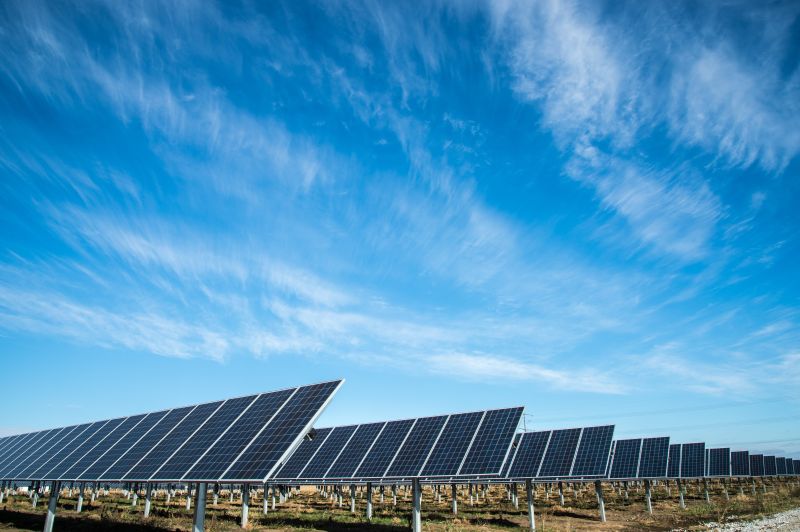Sunny Dispositions: Solar Panel Installations and Effects on the Arizona Real Estate Market

By Kelsey Fischer*
Every homeowner can attest that a highly determined sales group will come knocking at your door several times a week. This determined sales group is the solar energy business group, which sells solar panel units and the installation of such units. There has been a clear rise in interest in using renewable energy to reduce America’s carbon emissions. Renewable energies (solar, wind, geothermal, water, etc.) are both carbon-free and generate electricity without burning fossil fuels. Solar panels have become increasingly popular for numerous reasons.
The increase in solar panels as an energy source is primarily due to the fact that climate change poses a severe threat to the earth’s population.[1] Secondarily, the amount of fossil fuel energy available has fallen, so there has been a need for other energy sources. Lastly, solar panels have become increasingly desired due to government incentives.
Solar energy has been able to grow fast and is now becoming cost-competitive with fossil fuels.[2] Originally, most U.S. solar power came from utility-scale solar. However, more recently, residential- and commercial-scale solar (also known as distributed solar) has increased.[3] This increase in distributed solar is partially due to the fact that utility-scale solar requires a lot of land (which harms wildlife), a lot of financial resources up front, and a need for high-voltage transmission lines (which can lead to wildfires).[4] However, distributed solar reduces the concerns around land capacity needed for energy outcomes, decreases the financial up-front cost, and nearly eliminates all other social concerns as distributed solar does not require costly and dangerous transmission lines.
Both the federal and state governments have created several incentives due to the clear benefits of solar power, and specifically for distributed solar. In Arizona, installing solar panels can earn property owners both a federal and state tax credit. The federal government allows property owners to deduct twenty-six percent of the cost of installing a solar energy system from their federal taxes.[5] Additionally, Arizona residents can claim credit through the Renewable Energy Production Tax Credit. After installation, Arizona homeowners when filing personal income tax can get a reimbursement of twenty-five percent of the cost of their solar panels, up to $1,000.[6]
These tax credits are a positive reinforcement for homeowners to buy into solar. However, there are also negative consequences for those that do not buy into solar. The main negative consequence is that electric companies in Arizona are increasing their prices. In 2020, the U.S. Energy Information Administration placed Arizona as having the fourth-highest electricity prices in the western United States.[7] However, from 2020 to 2021, Arizona’s average electricity price increased by 6.0%.[8] There was another increase in 2022, and in 2023, SRP announced an additional 4.7% increase.[9]
These negative reinforcements, in combination with the positive incentives from the government, are further pushing property owners into solar, as solar allows owners to reduce their utility purchases and possibly even sell back excess energy to utility companies. There are many reasons to purchase solar, with the core ones being to save the environment and to save money.
The rise of solar panels throughout Arizona raises the question of the overall effects on the real estate market post-installation. There are several different things to consider. First, are developers or homeowners are taking on the costs? Second, are the systems leased or purchased? Due to increased utility prices, real estate developers may choose to implement solar during construction. This means that to accurately sell their properties to consumers, developers need to stay informed about solar technology and the products it requires.[10] Developers need to be able to explain how solar is a benefit to purchasers and that there is value in the property as it is cost-efficient and can save money on future utility bills.
When the purchaser is an individual property owner, the effects and costs are different. This is partially because owners can purchase or lease solar systems. When owners purchase solar, they have the possibility to save quite a bit of money. While there are costs on the front end (the costs of installation), there is arguably more benefit on the back end in the form of utility cost savings and increased home values.[11] However, distributed solar is still relatively new, and therefore, an increase in home value is detrimental to real estate agencies being informed on all things solar. Additionally, homebuyers are only informed of these benefits if agents inform them. As for statistics on the actual increase in home value from a solar installation, researchers found in 2017 that “solar panels owned by a home seller add 4 to 6 percent to the value of a home sale, often less than the cost of the panels.”[12]
If homeowners do not purchase solar, they can instead lease panels from third-party companies.[13] When homeowners lease panels, they are able to save on utilities, and one would assume there would be an increase in home value given the commodity of having solar. However, leased solar panels present some complexities in the sale of the house.[14] Leasing solar panels add an additional step in which the solar panel lease has to be signed over to the new homeowner.[15] Adding an additional lease on top of purchasing a home scares home sellers who do not know that the process is relatively simple and painless. In 2017, due to the perceived complexity of solar panel leases, houses that had leased solar panels actually sold for less than those without solar.[16]
Clearly there are strong advantages to solar—it can not only save the environment but the wallets of Arizonians. However, with more houses becoming a part of the solar movement, whether their panels are purchased or leased, there needs to be an increase in education around solar power. There seems to be a lack of information and training in the real estate market on the effects solar can have. Not enough real estate agents and appraisers understand the solar industry.[17] If they do not understand the solar industry, the true value of a house with solar, and the value of solar itself, cannot be calculated, resulting in lost revenues for solar companies. The Arizona real estate industry faces rising prices and a steadily increasing population. If the real estate industry wants to thrive in the face of inflation and population increase, there needs to be an educational movement about the reality of solar.
* J.D. Candidate, Class of 2024, Sandra Day O’Connor College of Law at Arizona State University.
[1] Camilo Mora et al., Broad Threat to Humanity from Cumulative Climate Hazards Intensified by Greenhouse Gas Emissions, 8 NATURE CLIMATE CHANGE 1062, 1062 (2018).
[2] TROY A. RULE, RENEWABLE ENERGY LAW, POLICY, AND PRACTICE 354 (1st ed. 2018).
[3] Id.
[4] Id.
[5] 26 U.S.C. § 48.
[6] Income Tax Credit for Residential Solar Devices, ARIZ. DEP’T REVENUE, https://azdor.gov/news-events-notices/news/income-tax-credit-residential-solar-devices (Mar. 16, 2022).
[7] Jennifer Pullen, Soaring Prices: What Does that Mean for Electricity Costs, MAKING ACTION POSSIBLE (Jan. 31, 2022), https://mapazdashboard.arizona.edu/article/soaring-prices-what-does-mean-electricity-costs.
[8] Id.
[9] Dani Birzer, Electric Bill Going Up for SRP Customers, AZ FAM. (Sept. 12, 2022), https://www.azfamily.com/2022/09/12/srp-increases-monthly-utility-bill-costs-residents/.
[10] Solar Energy Tech. Off.,Solar Energy Guide for Homebuilders, U.S. DEP’T ENERGY, https://www.energy.gov/eere/solar/solar-energy-guide-homebuilders.
[11] Jacob Marsh, Zero-Down Solar Financing Options: Which Is Best for You?, ENERGYSAGE (Sept. 1, 2020), https://news.energysage.com/zero-down-solar-financing-options/.
[12] Ryan Randazzo, Solar Can Raise Home Values—If You Own the System, AZ CENTRAL (July 17, 2015), https://www.azcentral.com/story/money/real-estate/2015/07/17/solar-raise-home-values-system/30296123/.
[13] Brian Palumbo, Comment, Looking in the Side-View Mirror: Assessing the Current and Future State of the Solar Energy Industry as It Reaches the Mainstream, 41 COLUM. J. ENV’T L. 183, 192 (2016).
[14] Solar Energy Tech. Off., Homeowner’s Guide to Going Solar, U.S. DEP’T ENERGY, https://www.energy.gov/eere/solar/homeowners-guide-going-solar.
[15] Randazzo, supra note 12.
[16] Id.
[17] Id.


